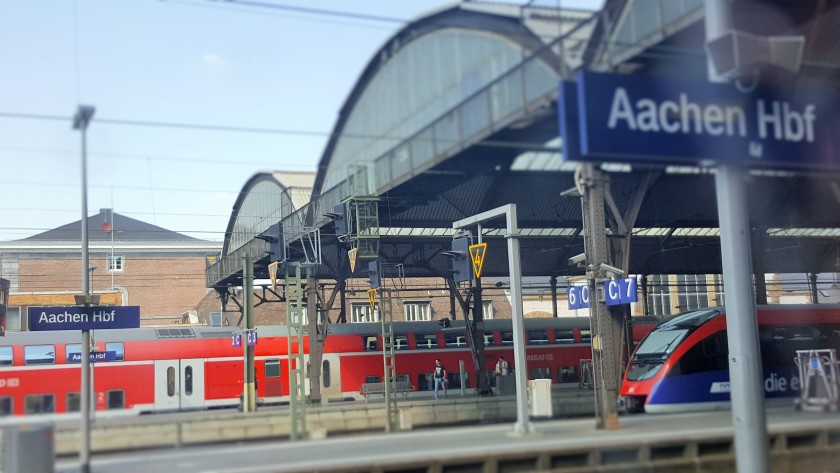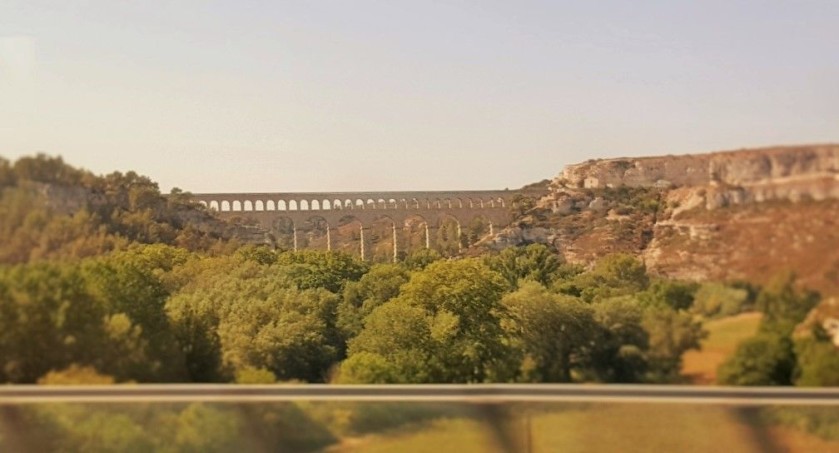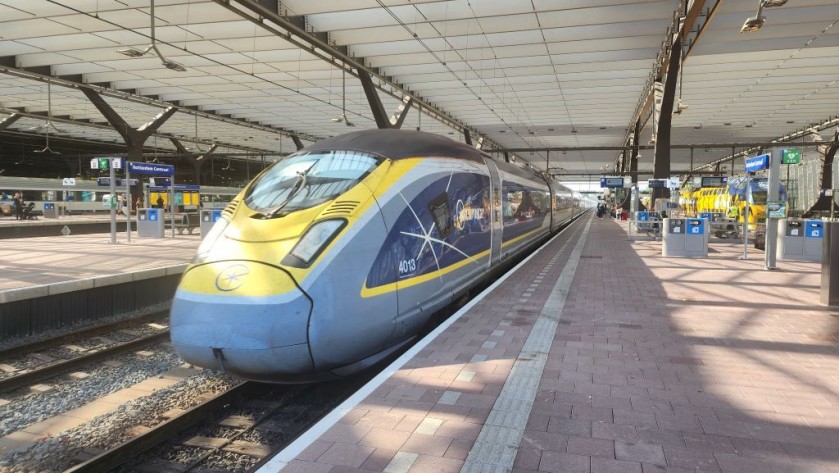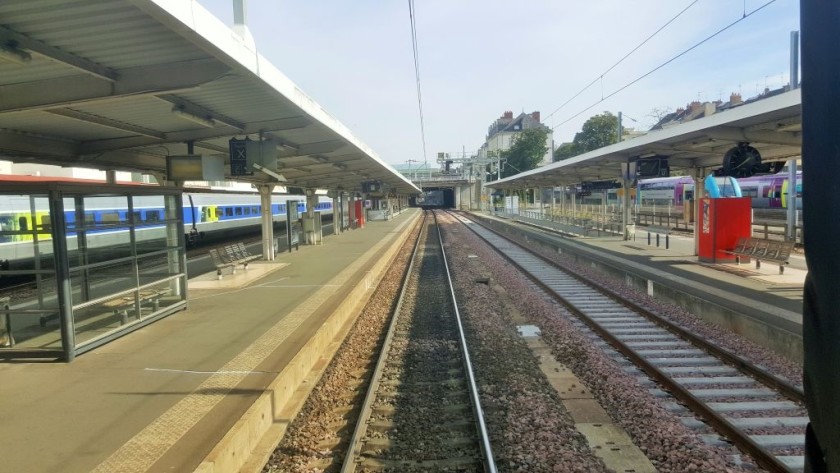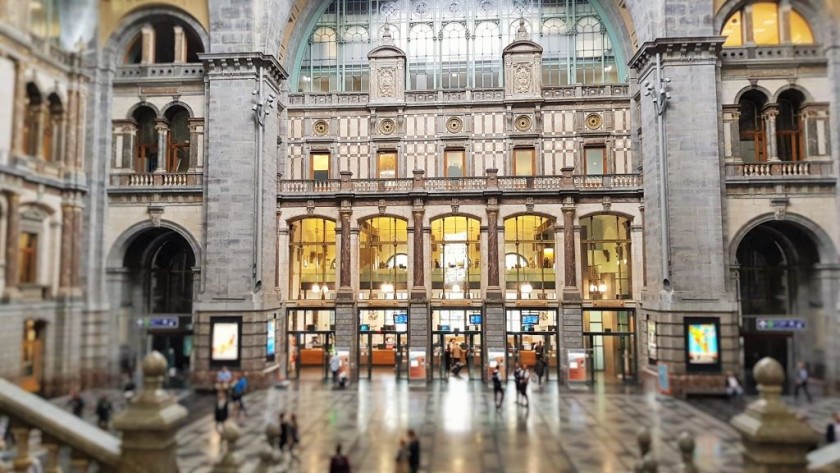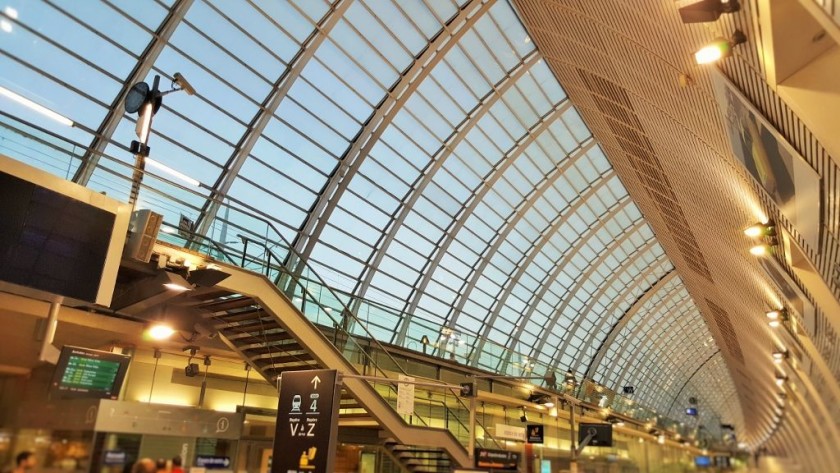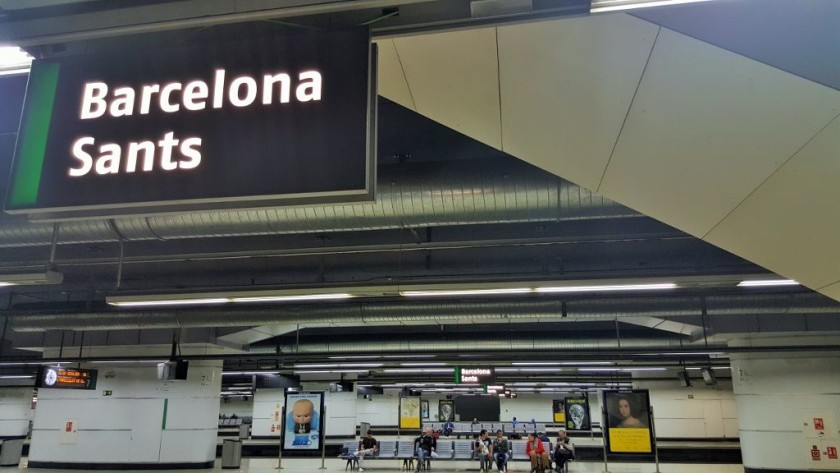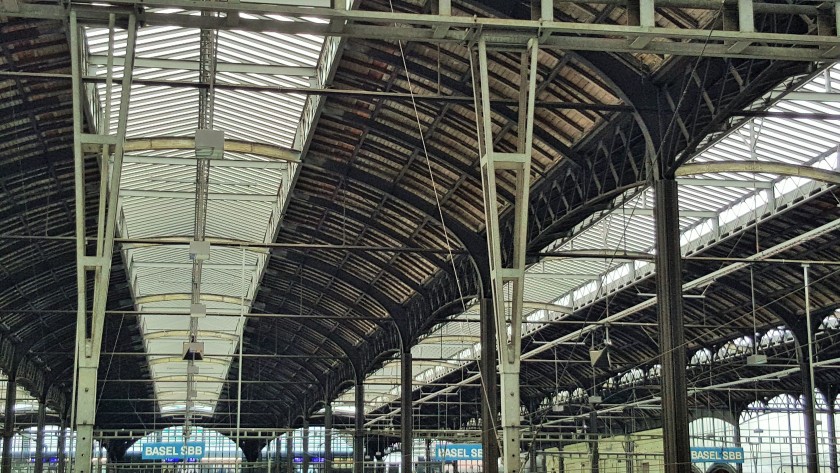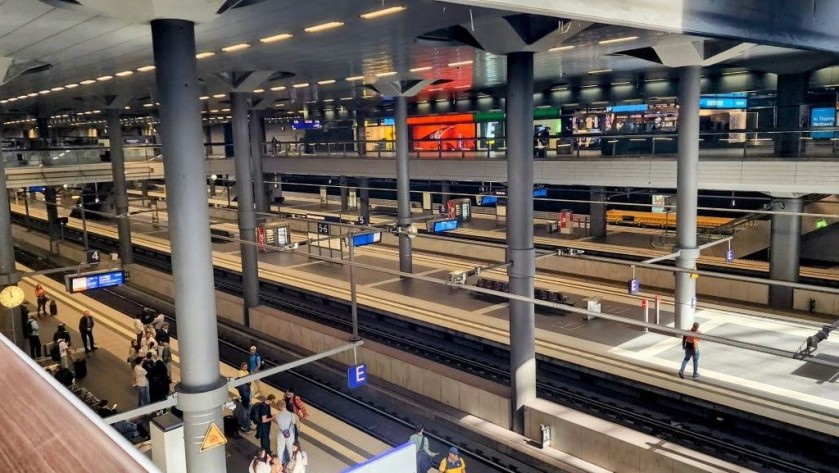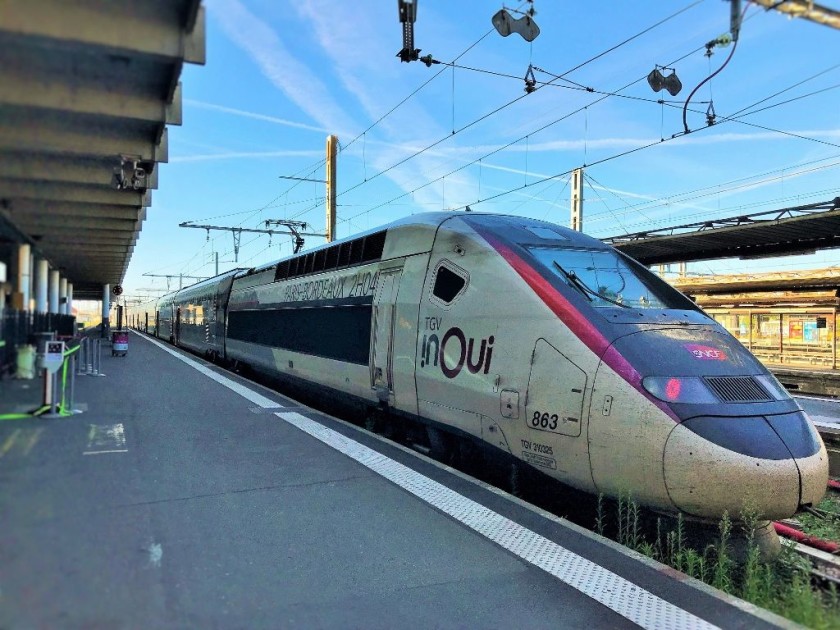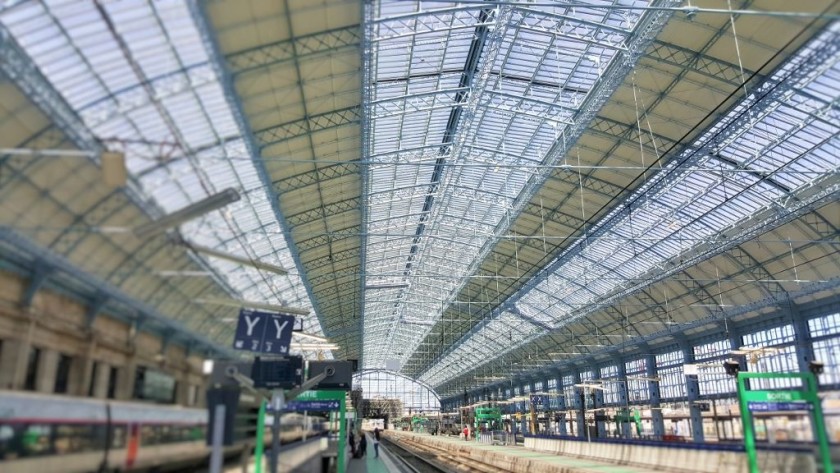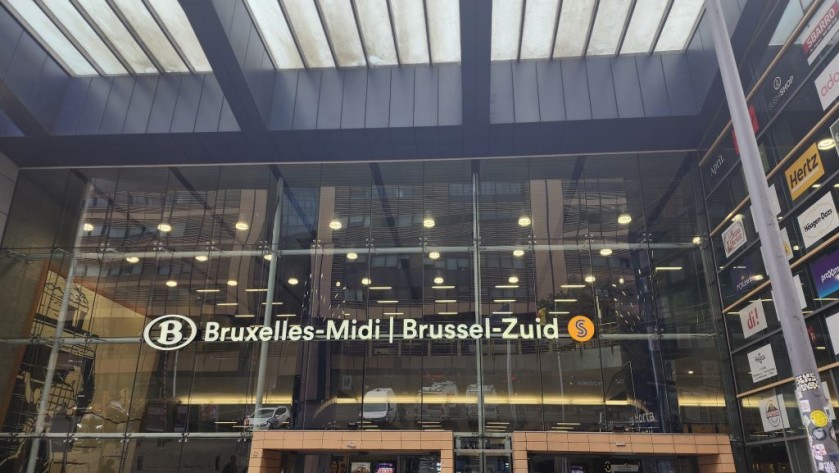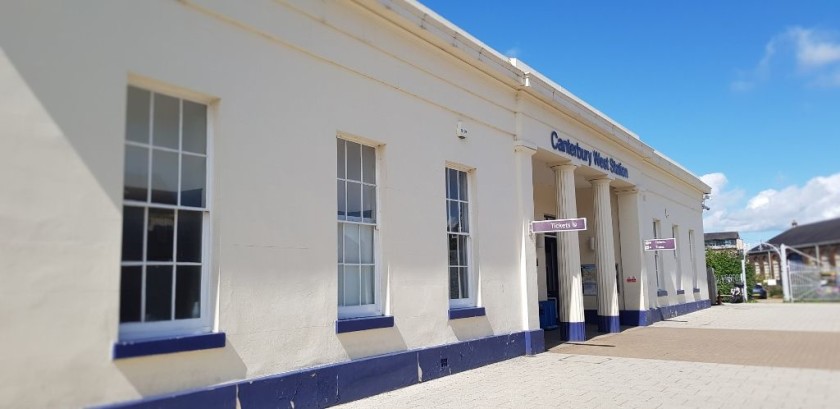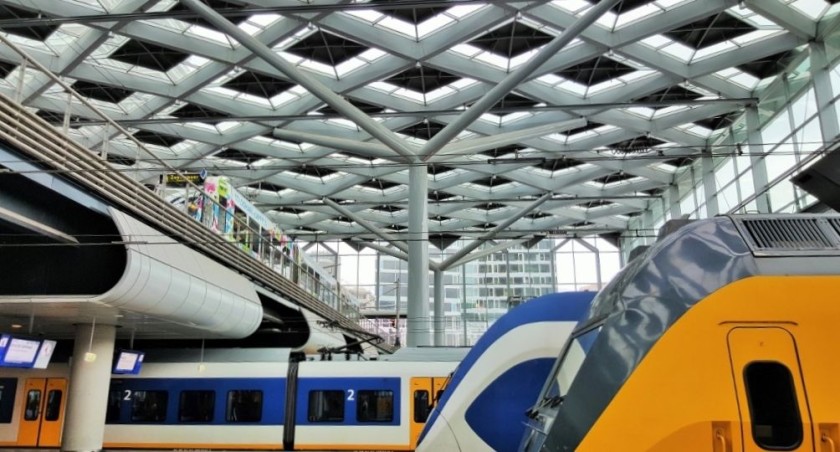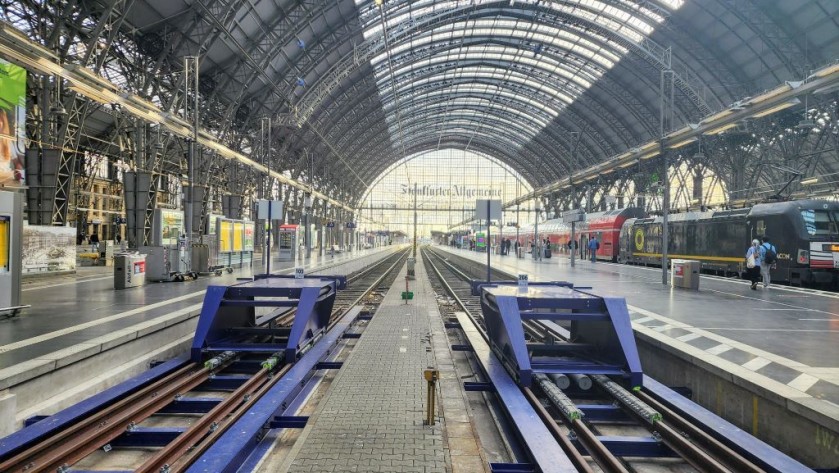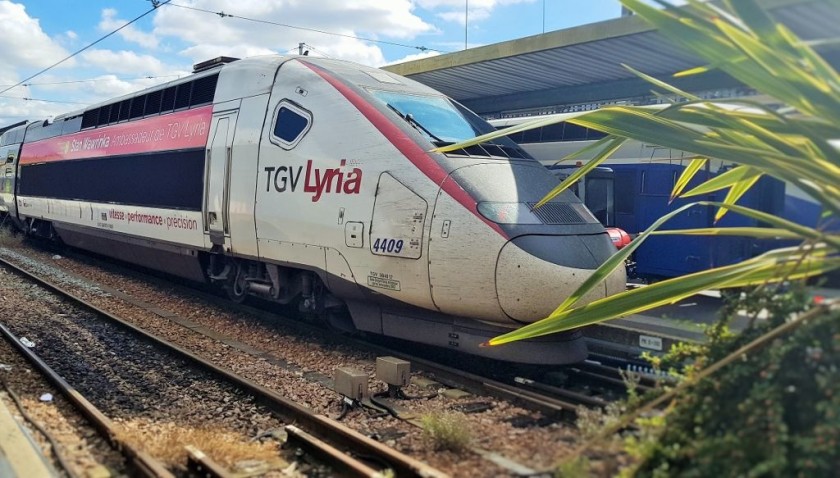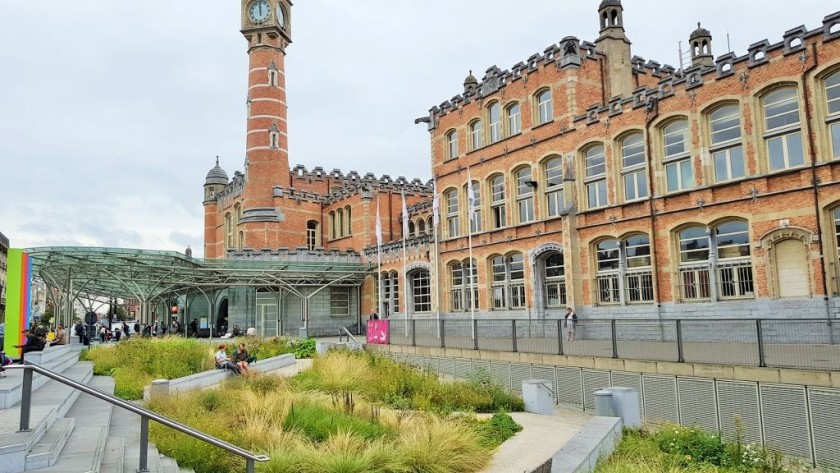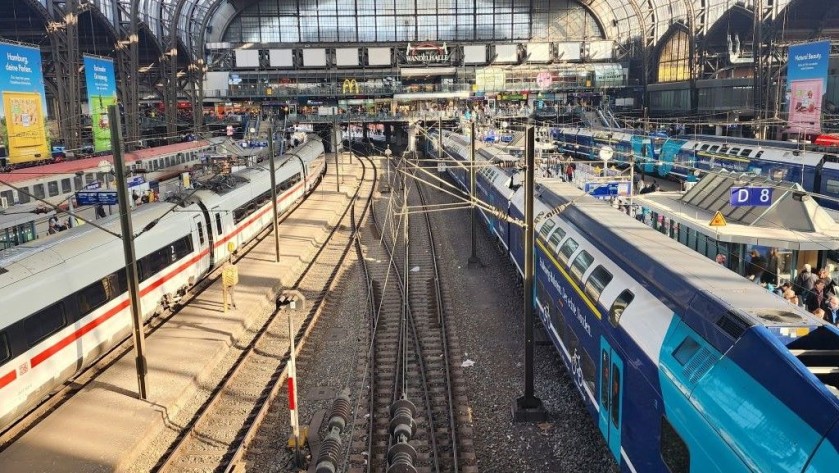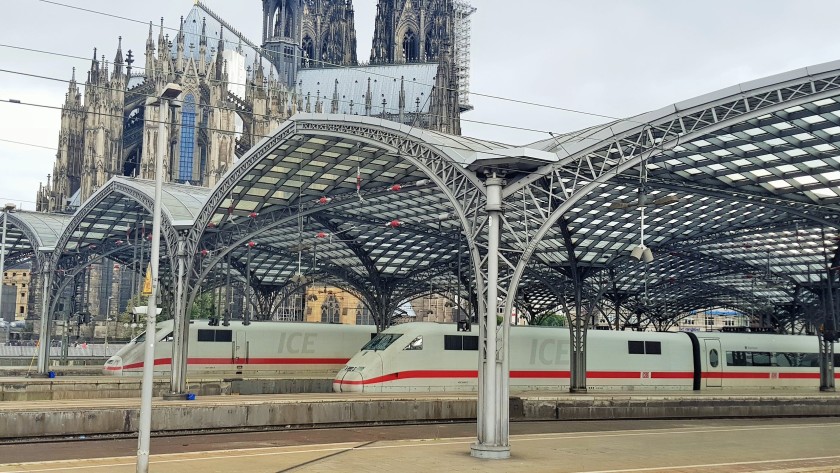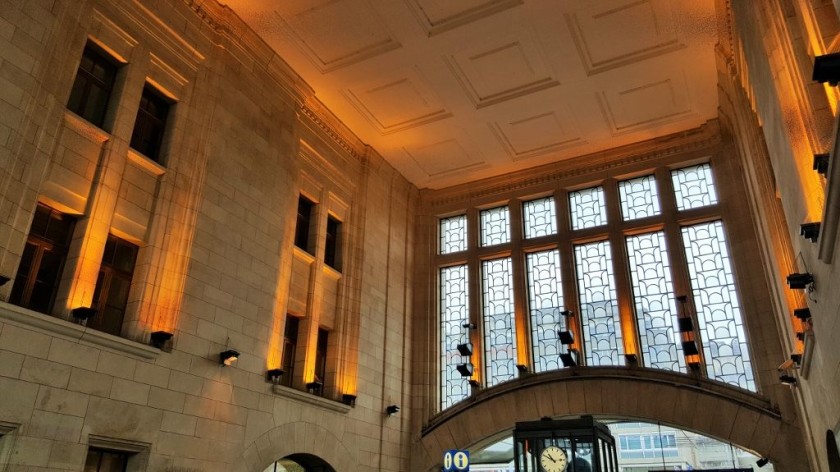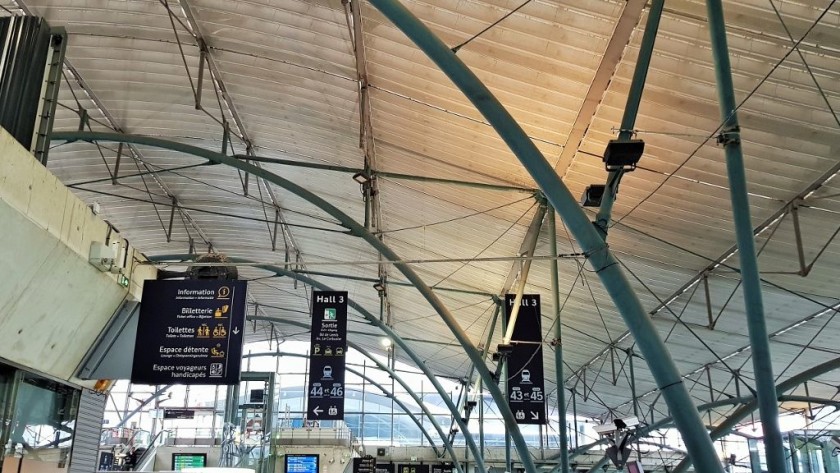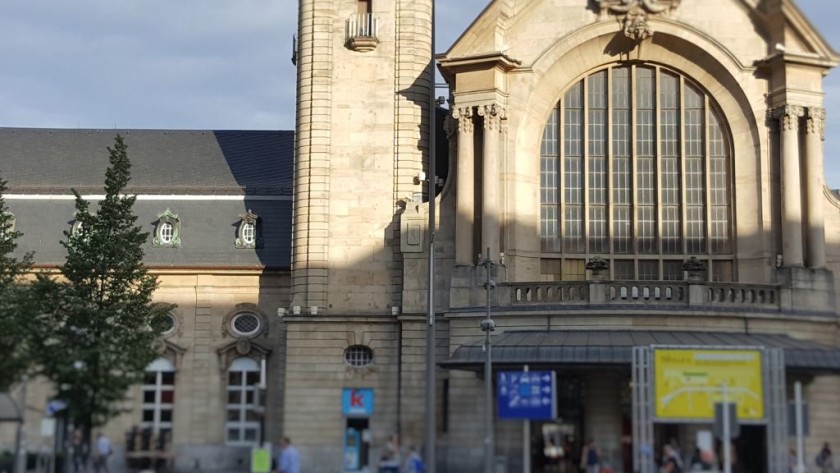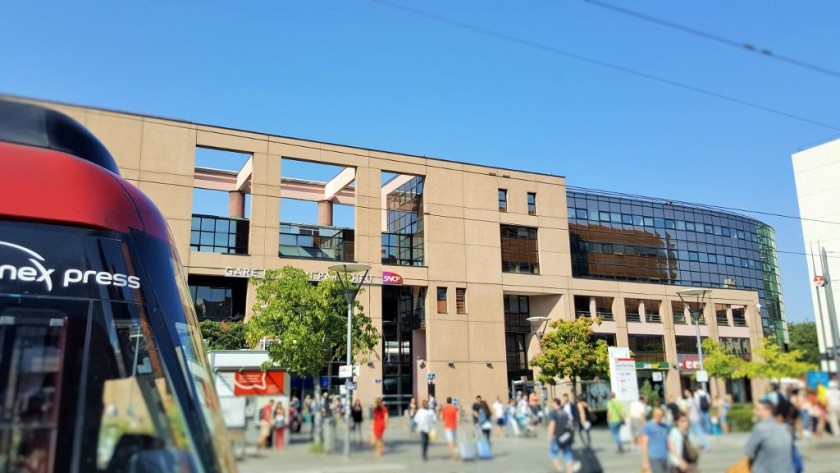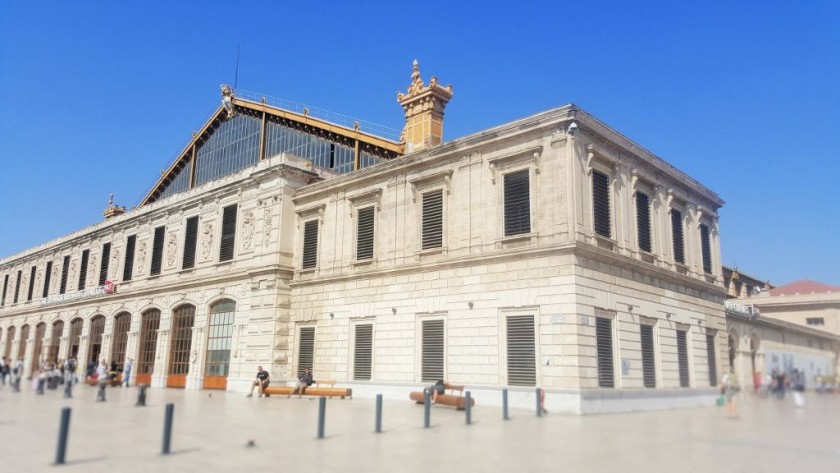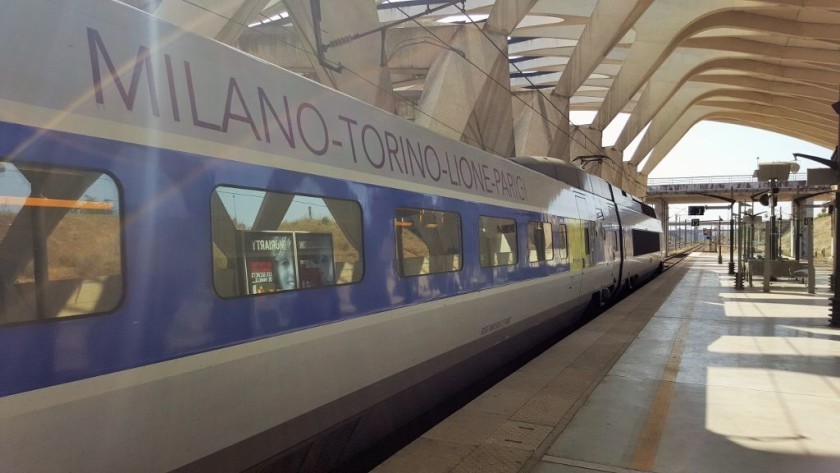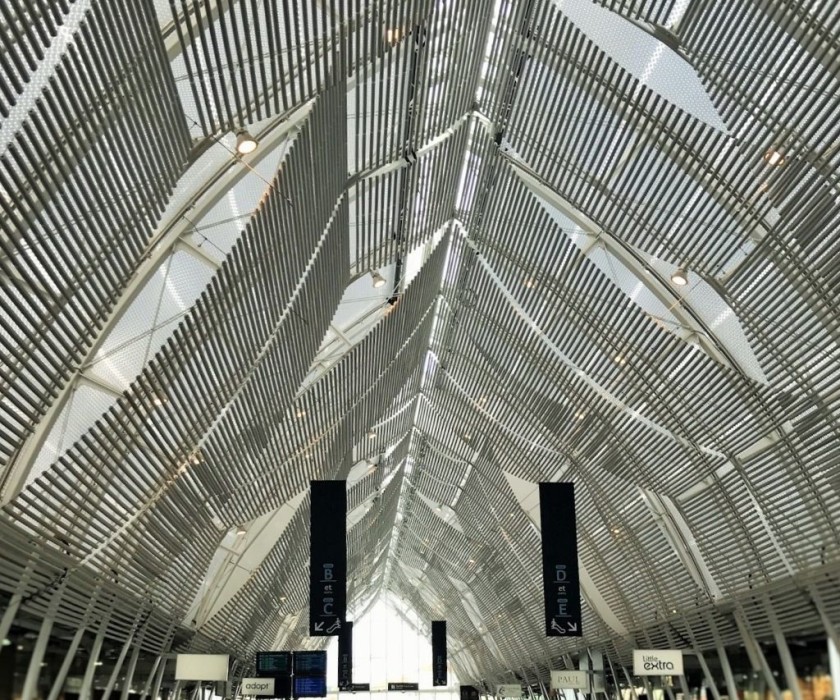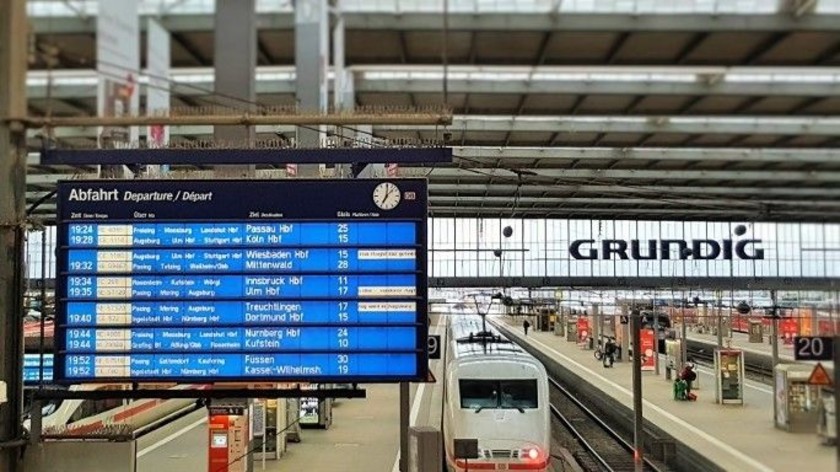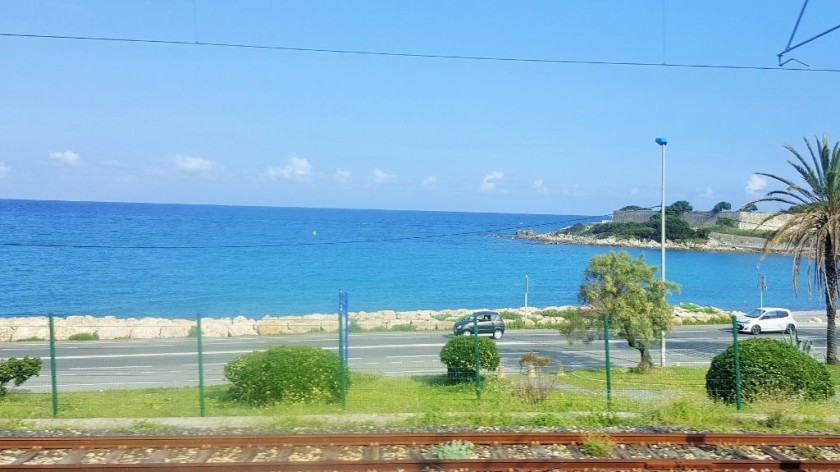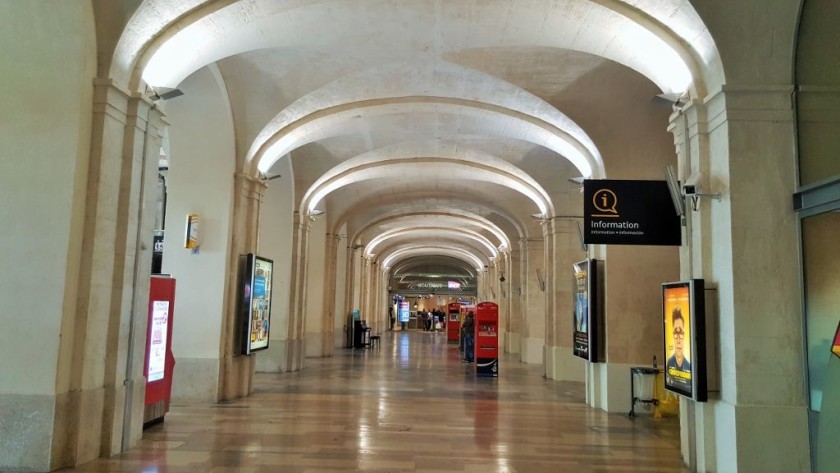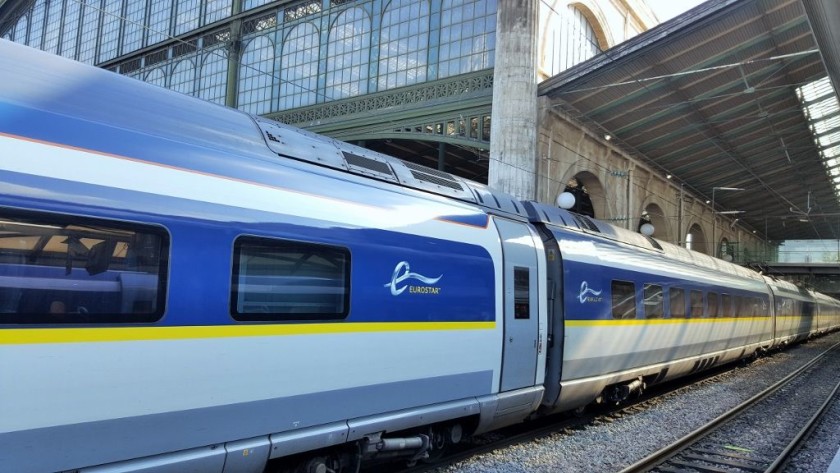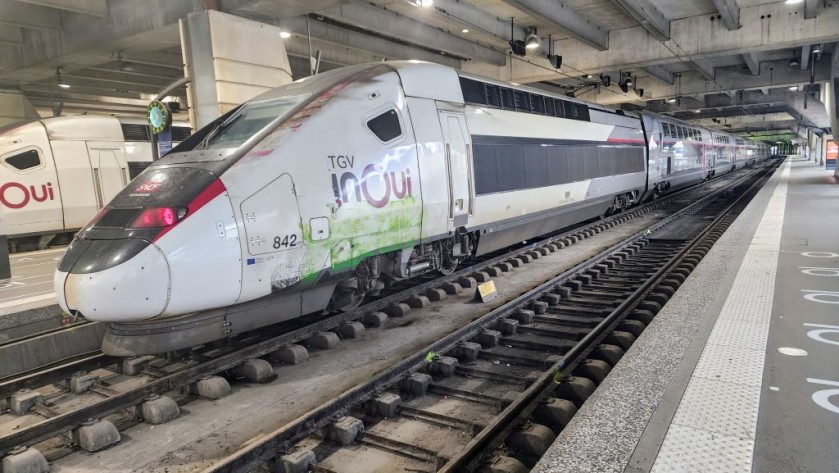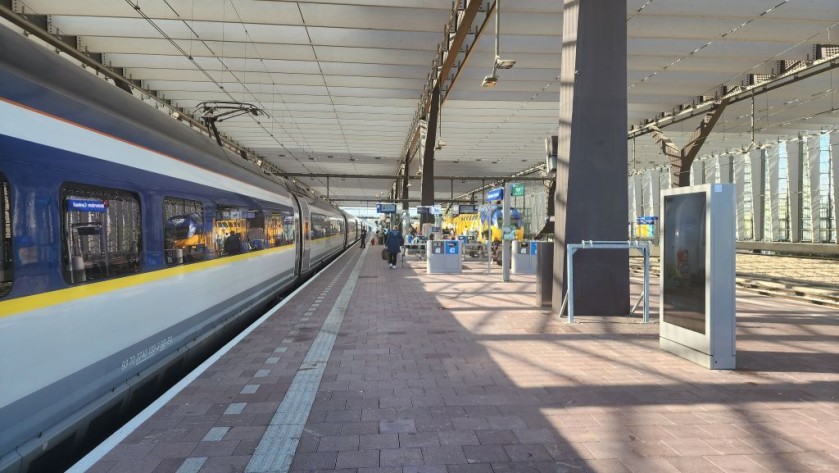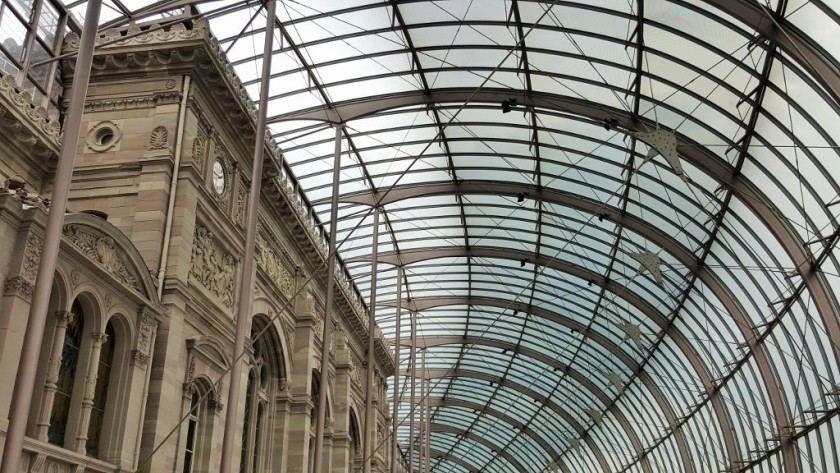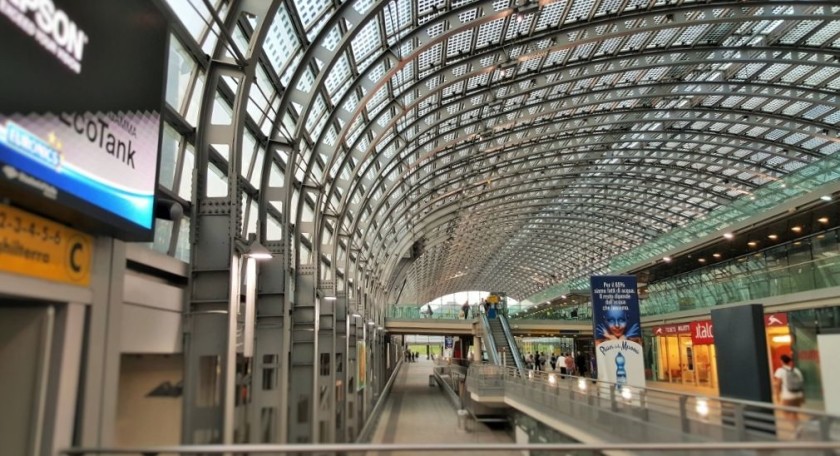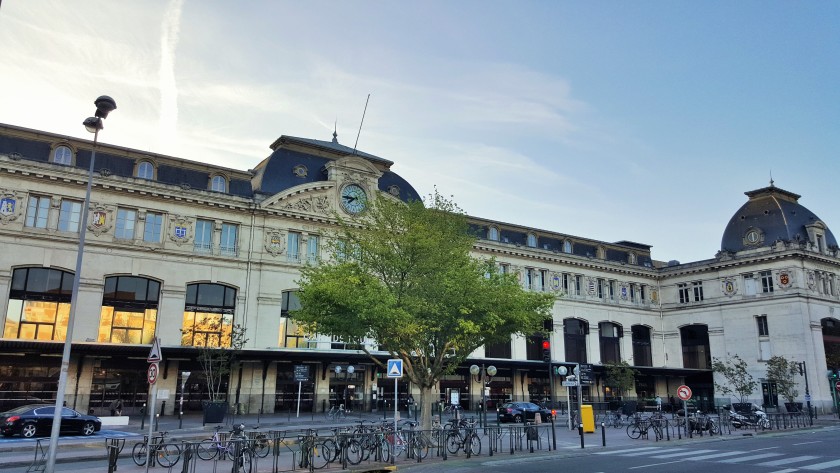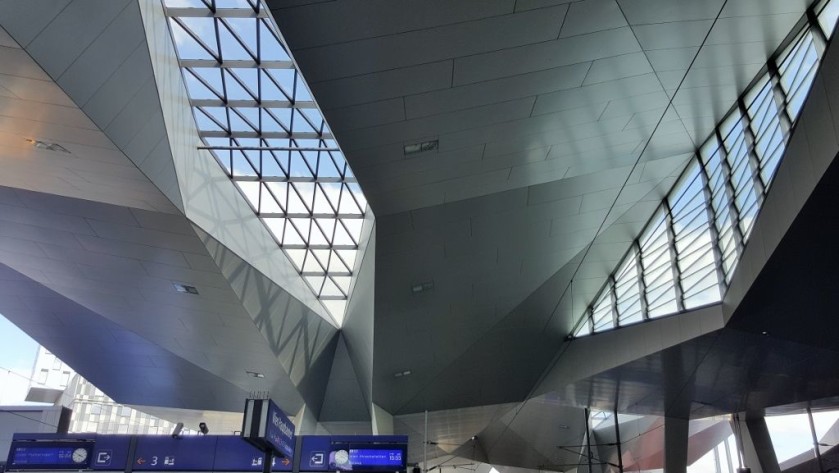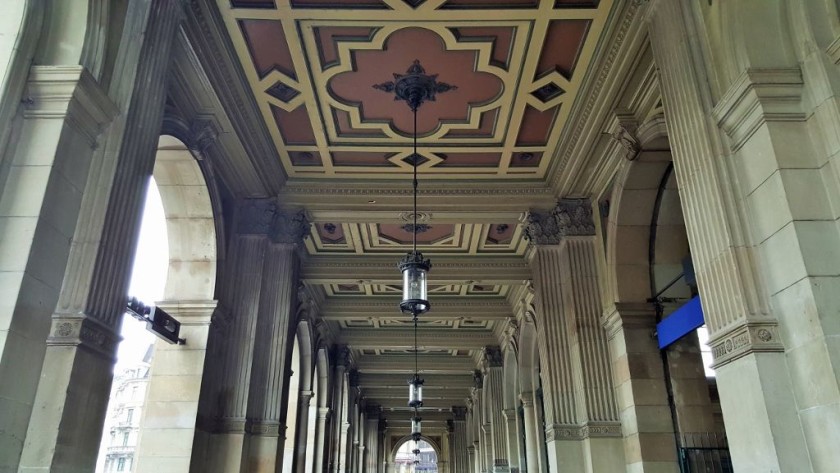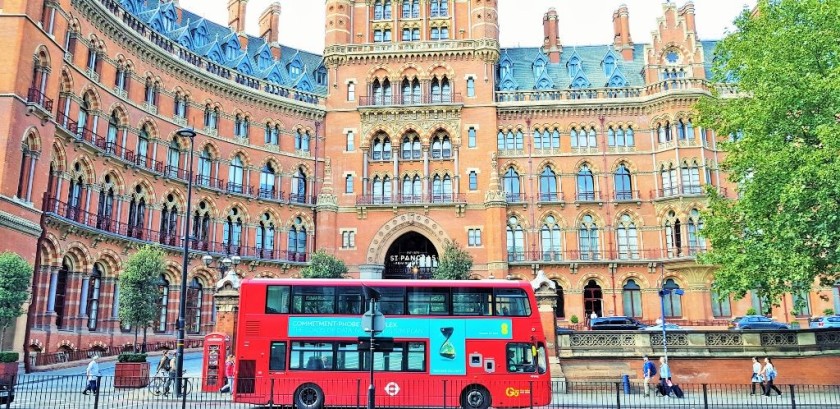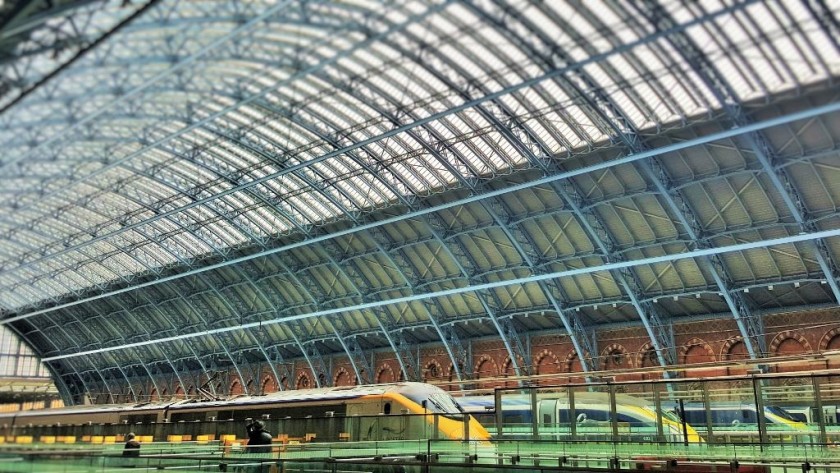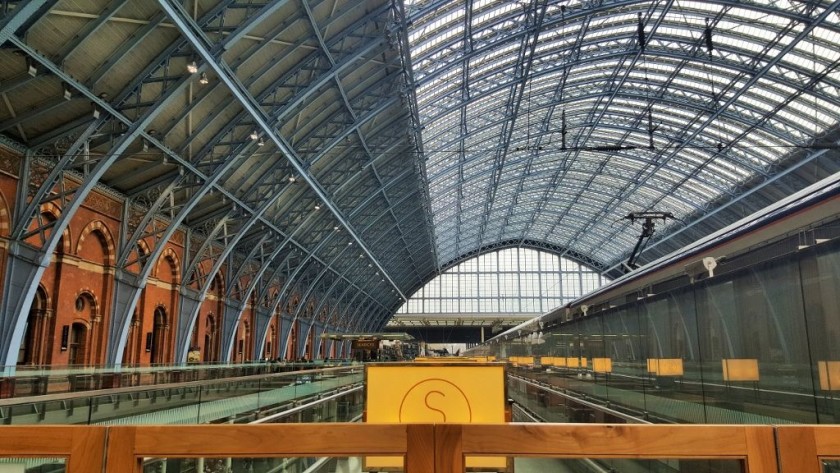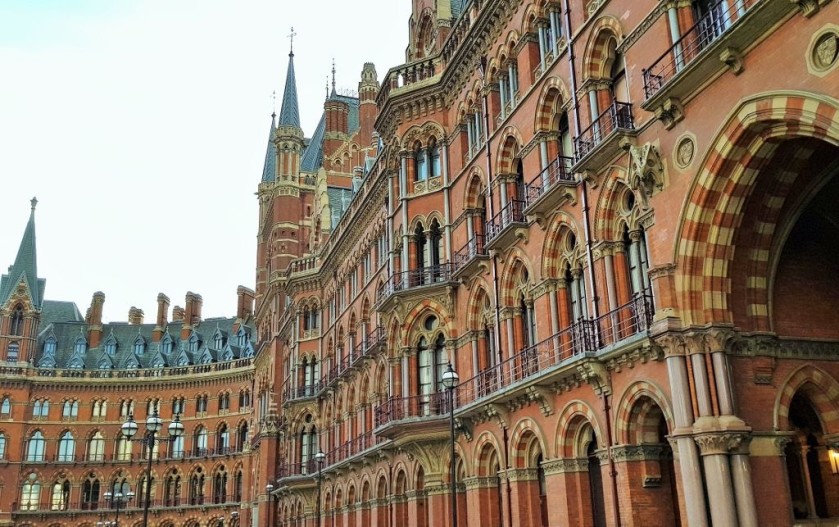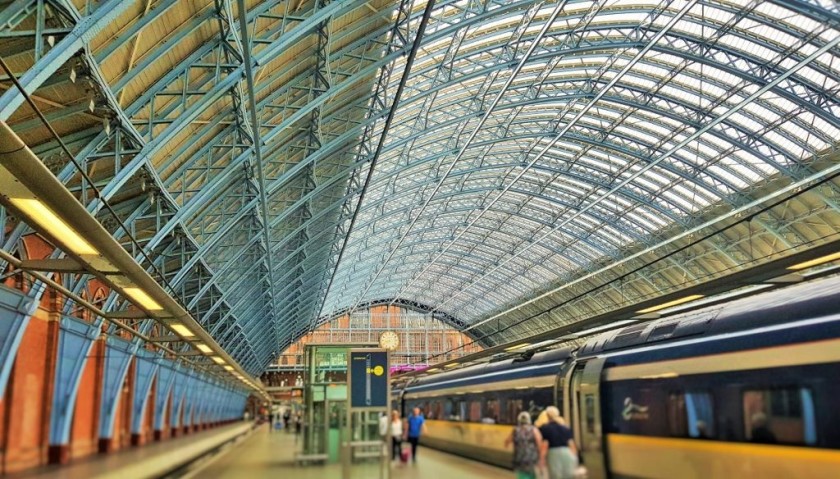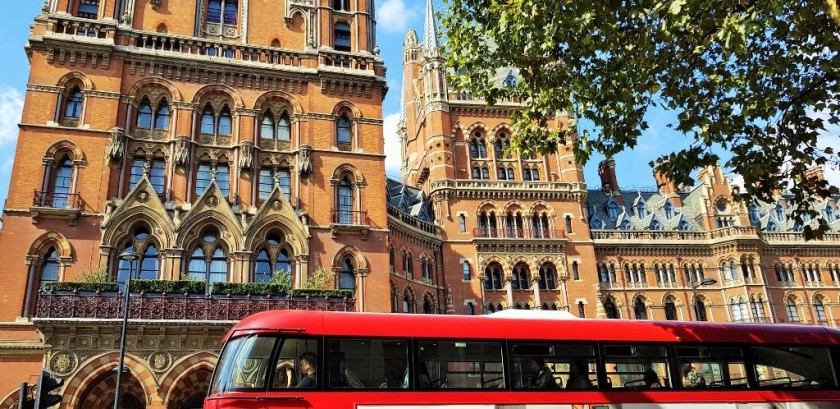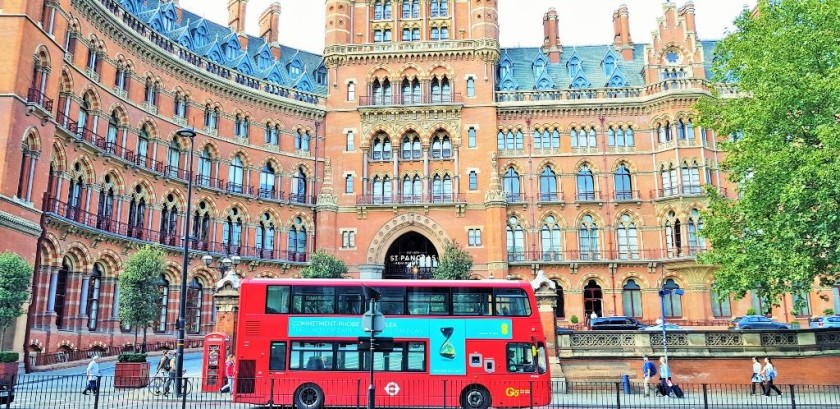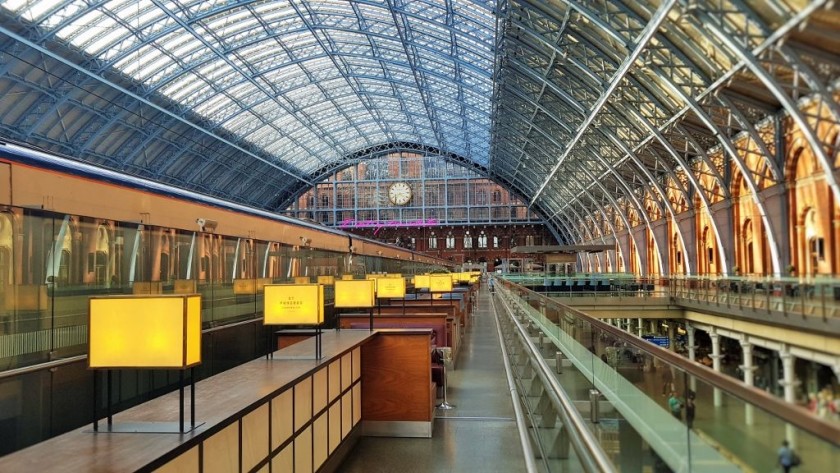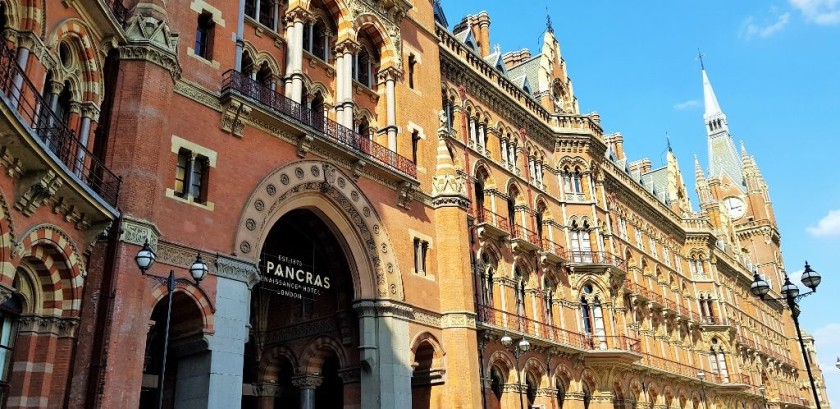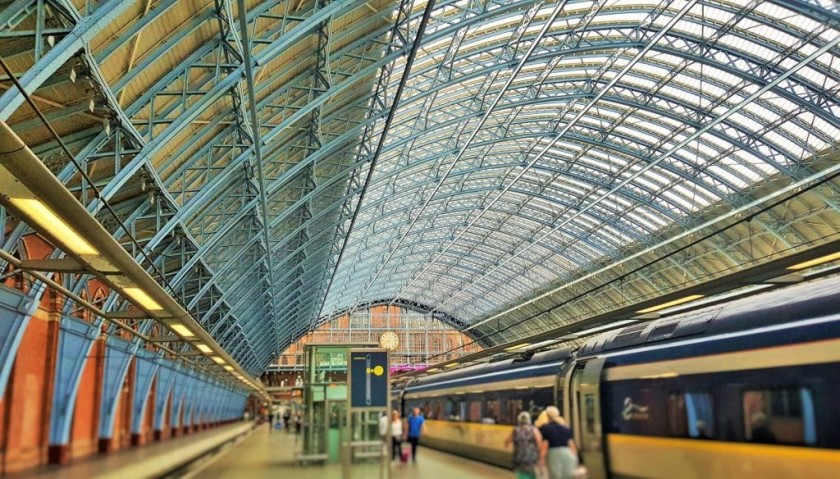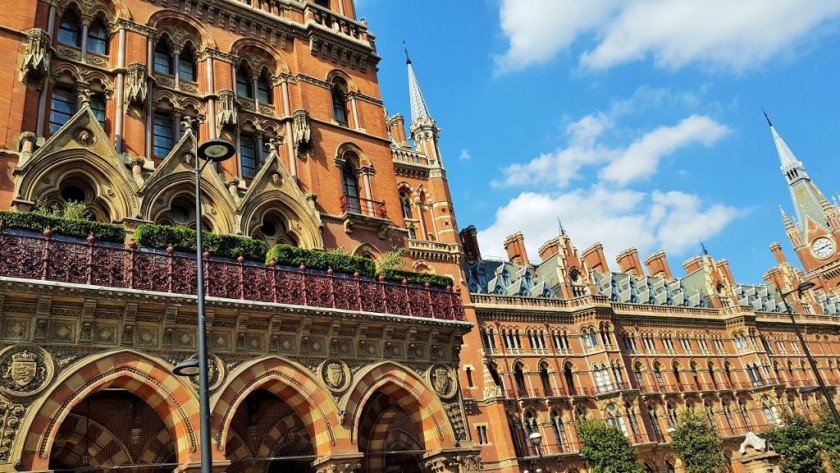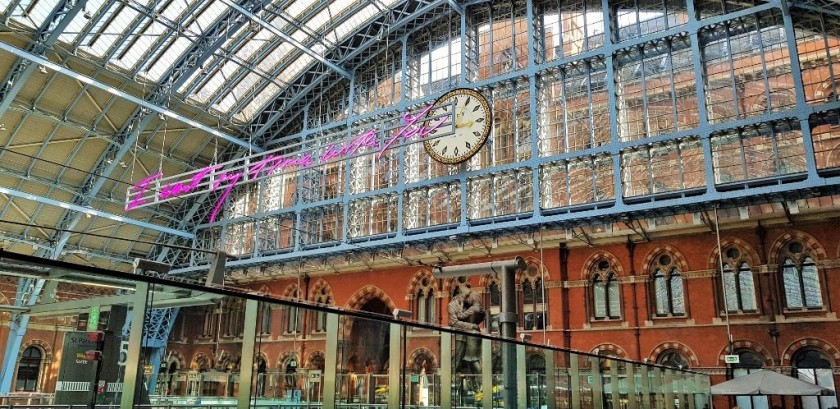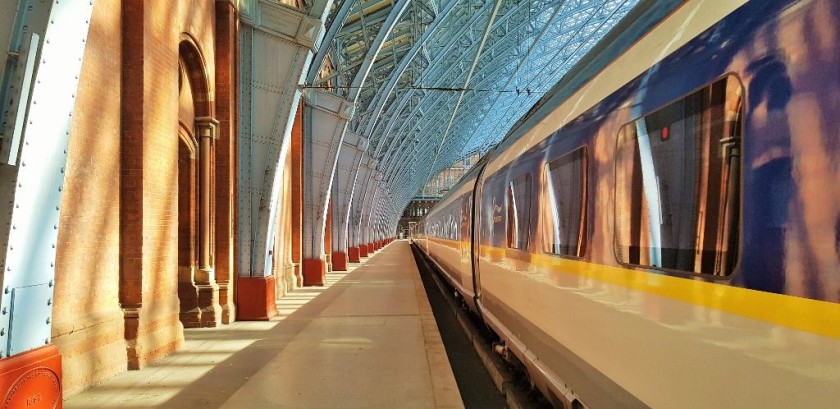Related Content
Content
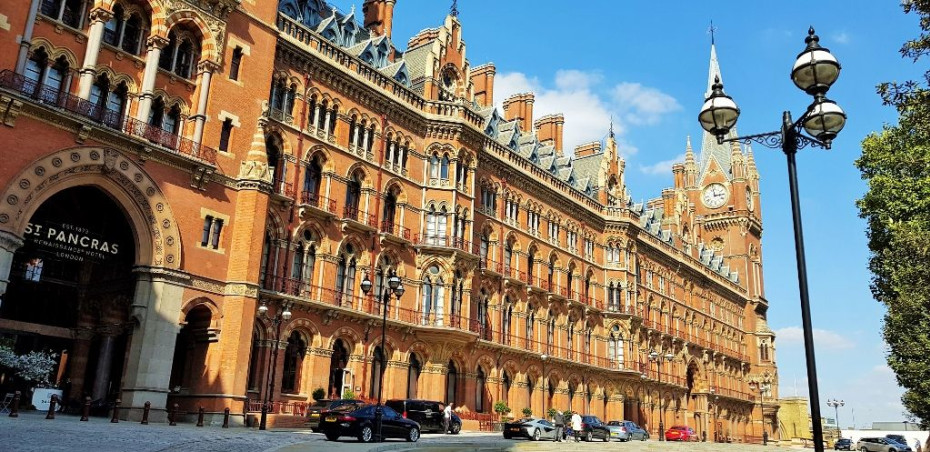
London St Pancras International (London)
This guide to using magnificent St Pancras International train station explains;
(1) how to navigate the station;
(2) what to be aware of when arriving and departing by Eurostar and other train services;
(3) how to make onward connections to the city centre and airports
(4) what facilities are available at the station.
Share
At a Glance
Services
Left Luggage
Travel Information Desk
First Class Lounge
Local Tourism Information
Onward Travel
Metro
Bus Station
Car Hire
Taxi Rank
Accessibility
Step Free
Misc
Terminus Station
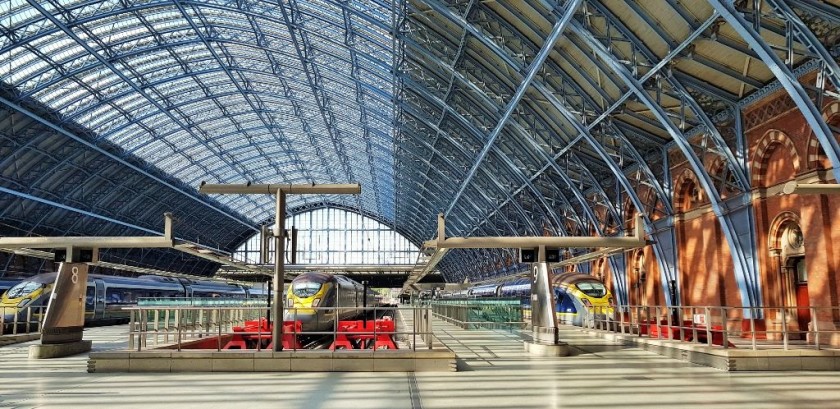
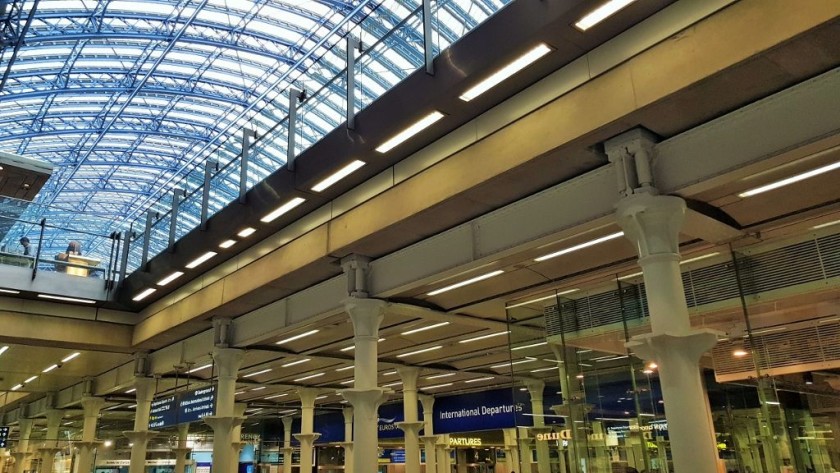
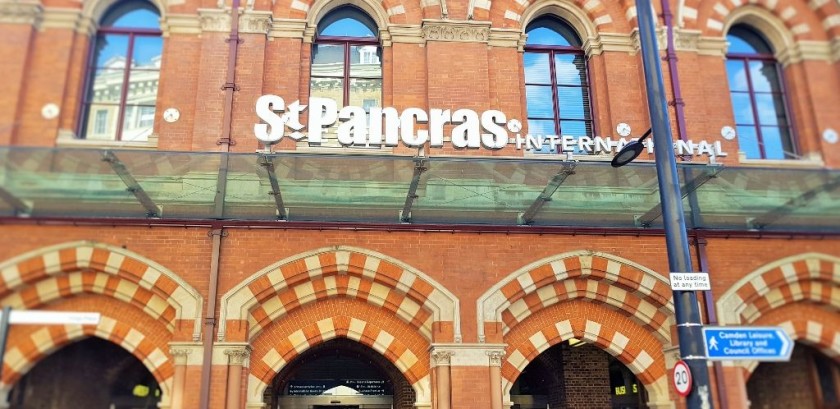
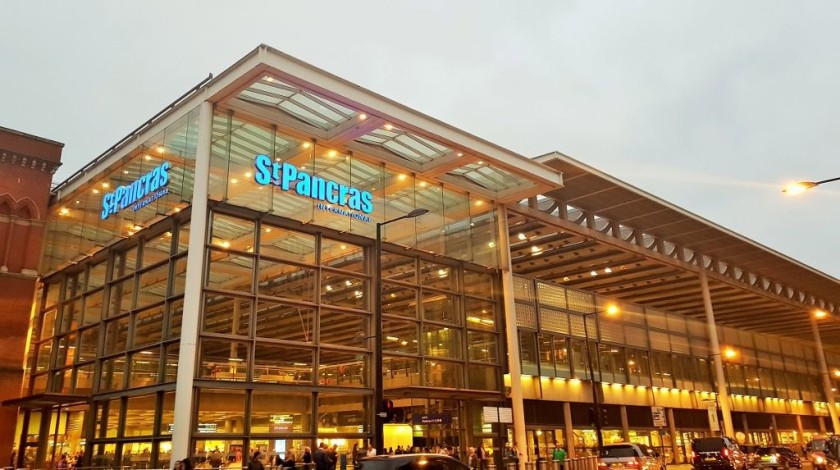
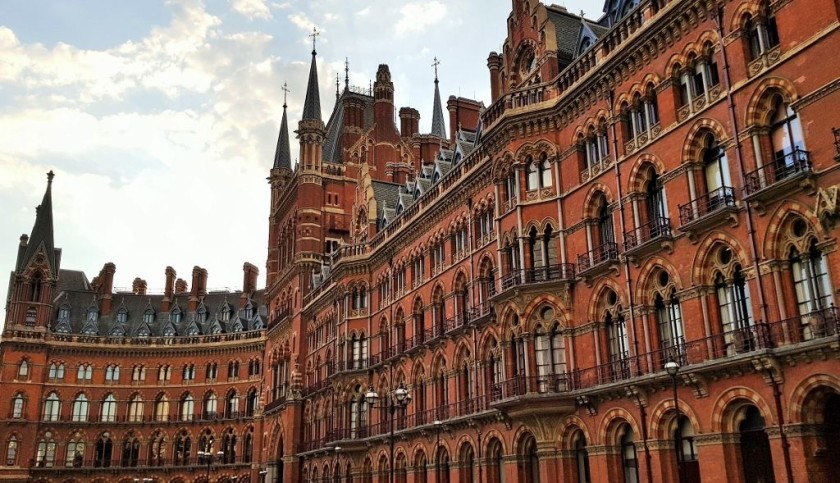
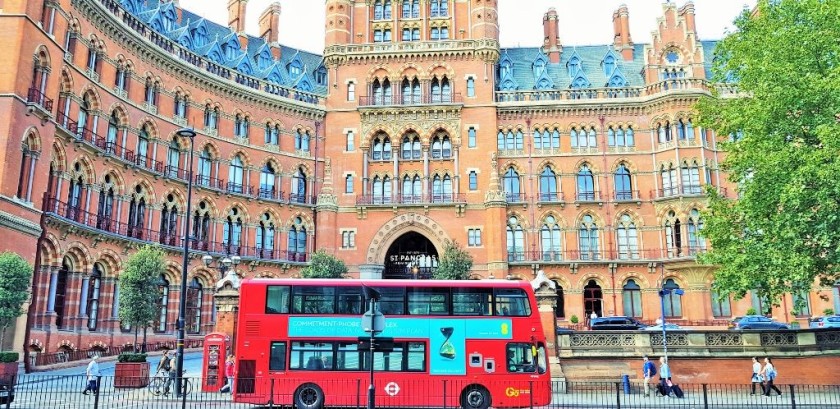
Helpful Links
An introduction to using St Pancras International:
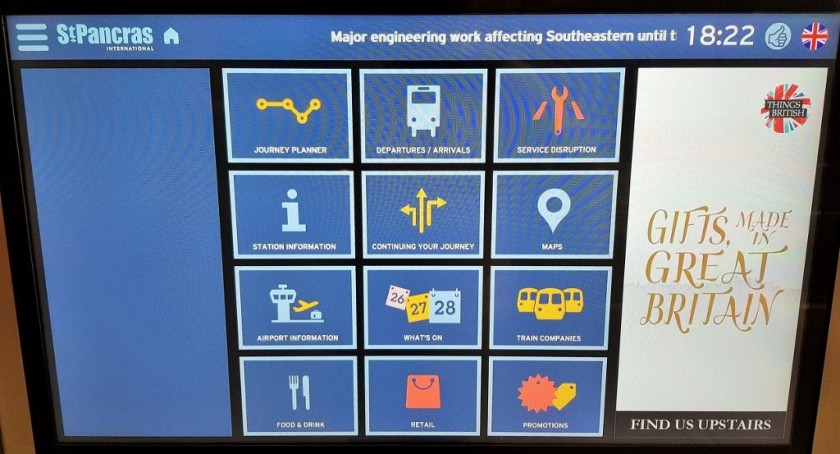
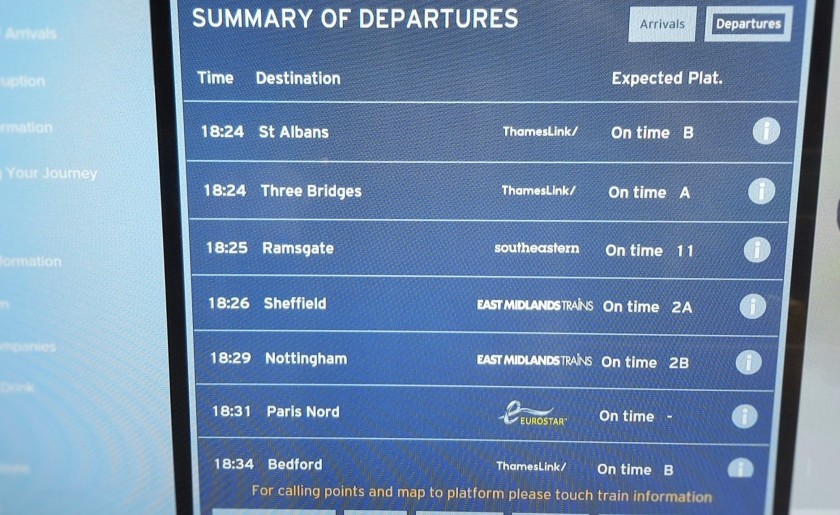
The modern adaptation of glorious 19th century station architecture at St Pancras International, has created a building that is an awe-inspiring location to have a meal/drink and to indulge in some high end shopping.
Hence a website on which it's primary function as a place from which to catch a train isn't particularly obvious.
However, if you are taking a train from St. Pancras International it can be confusing space to navigate; particularly if you are a first time user.
What can be a big help with finding your way through the station are its interactive info guides.
At first glance they resemble the info guides you can find in large shopping malls, which you can tap to discover the location of a store etc.
These screens at St Pancras International are also store guides, but they ALSO offer a wealth of useful info to help you find your train.
They are convenient because the signage understandably struggles to cope with the complexity of the station layout.
If you’re a first time user, St Pancras International isn’t a location where you want to be catching a train against the clock.
Train service summary:
The following train services arrive at and depart from St Pancras International station:
(All services call at more locations than those listed below)
Eurostar services on two routes:
- to Paris Gare du Nord
- to Lille-Europe - Bruxelles-Midi - Rottterdam-Centraal - Schiphol Airport - Amsterdam-Centraal
EMR trains on three routes:
- to Leicester - Loughborough - Derby - Chesterfield - Sheffield
- to Kettering - Leicester - Loughborough - Nottingham
- to Luton Airport - Bedford - Kettering - Corby
Thameslink trains:
- from platform A to Brighton, Gatwick Airport, Greenwich, Redhill and Rochester
- from platform B to Bedford, Cambridge*, Luton Airport, Peterborough and St Albans
*= faster and more frequent trains depart from King's Cross station, a two minute walk from St Pancras
Southeastern hi-speed trains on two routes:
- to Gravesend - Rochester - Faversham - Whitstable - Herne Bay - Margate - Broadstairs - Ramsgate
- to Ashford - Canterbury - Ramsgate - Broadstairs - Margate
Journey Guides to many of these destinations are located at the foot of the 'Contents Menu'.
Good to know:
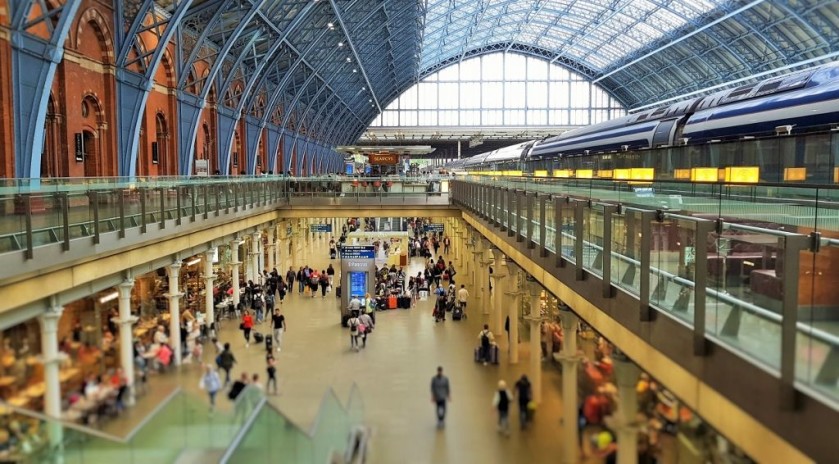
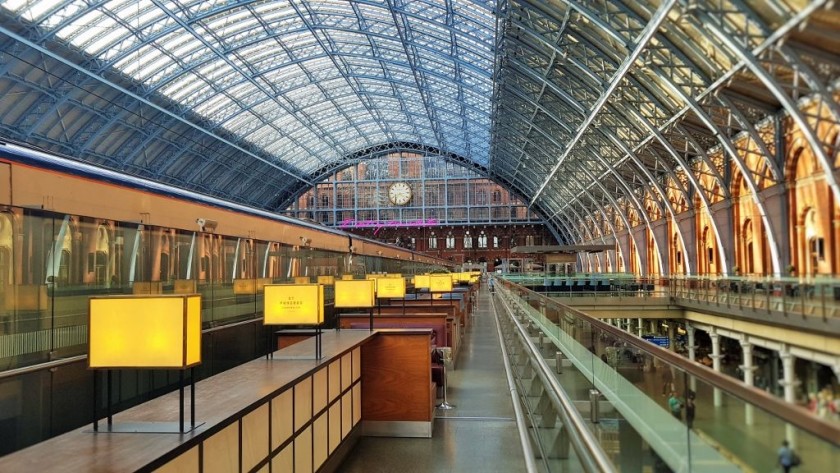
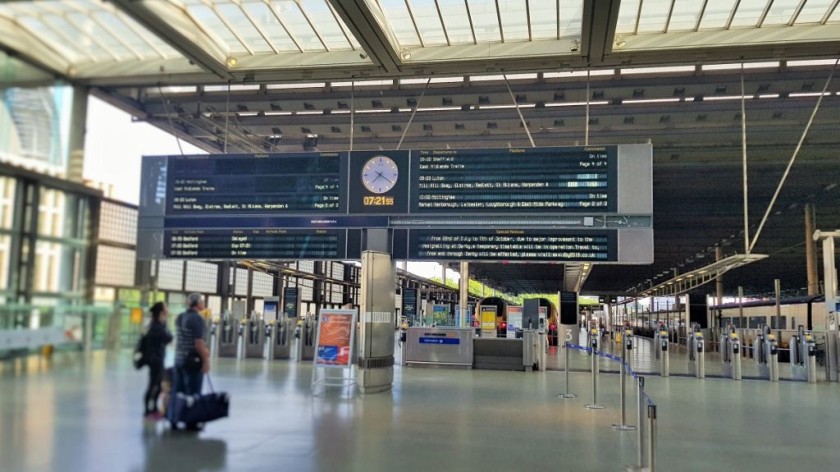
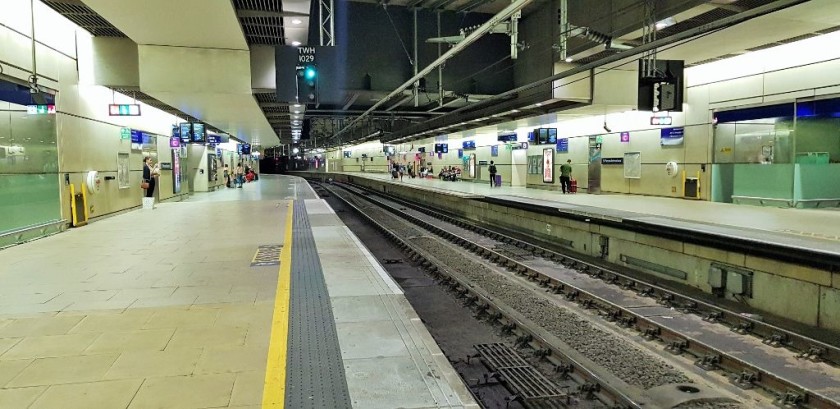
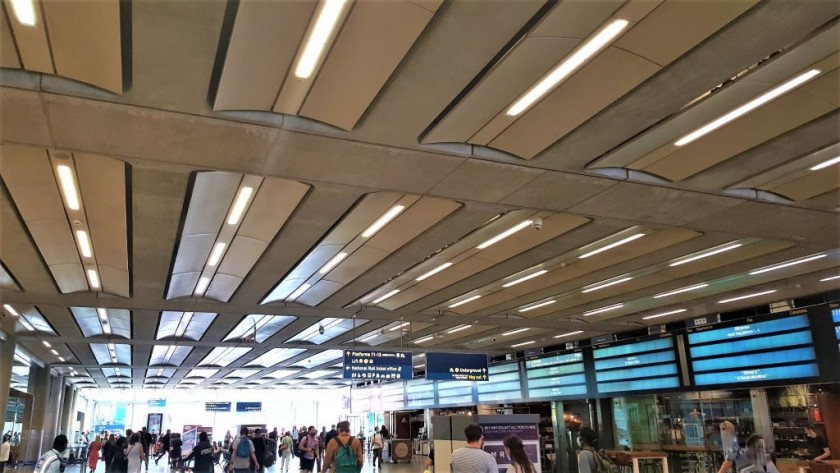
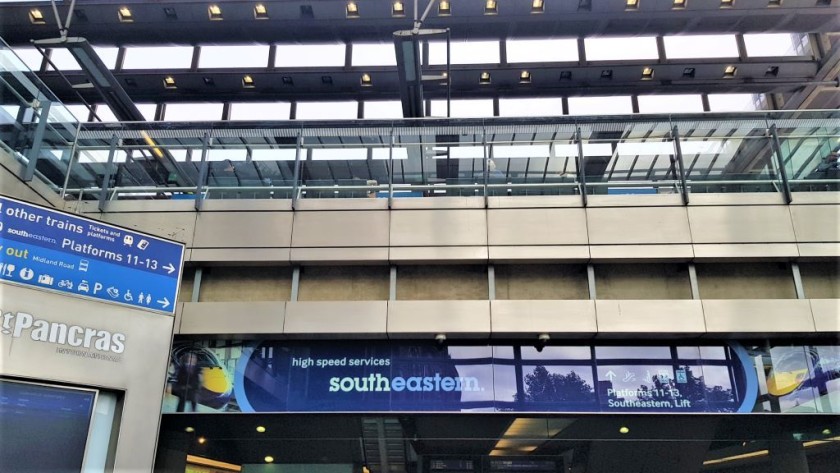
Five things also worth knowing about St. Pancras International:
(1) St Pancras International station can be a complicated space to navigate because it is in effect six stations in one location:
- the Eurostar trains terminal
- the East Midland Trains terminal
- the southeastern hi-speed trains terminal
- the ‘Thameslink’ station
- the Circle / Metropolitan / Hammersmith & City underground lines
- the Victoria / Piccadilly / Northern underground lines.
Each of which has a dedicated or optimum entrance.
(2) If you're NOT taking the Eurostar and you aleady have a ticket, it’s still generally a good idea to arrive at St Pancras International a minimum of 10 mins before your train is due to depart.
It's a large space to navigate; for example making the transfer between the Picadilly Line of the Undergound and the East Midlands trains terminal, takes around 5 mins.
(3) If you are taking the Eurostar allow 10 mins to make your way to the Eurostar check-in area.
ADD this 10 mins on to Eurostar's recommended time required to check-in.
(4) If you are catching a Eurostar be aware that the station isn't solely dedicated to Eurostar trains.
The Eurostar departures area is not the the dominant feature of the building.
Depending on how you enter St Pancras, the access to Euostar departures can be out of sight.
And Eurostar arrivals is merely a set of doors which open into the main shopping arcade at the station.
(5) The trick to making the most of what St Pancras International has to offer is to arrive at the station around 90 mins before your train departs.
And if you do opt for that, head to the upper level bars and restaurants.
They're quieter, more spectacular and you can watch the Eurostar trains glide in and out of the station; what could be more wonderful!
The upper level also gives access to the bars and eateries in the stunningly restored St Pancras hotel, for the ultimate pre train journey experience!
Book Accommodation
ShowMeTheJourney has partnered with Stay 22 to offer three options for discovering your optimum accommodation:
1: Use the map above to see which hotel rooms and Vrbo rentals, with easy access to St Pancras International, are available.
2: Or click on these cherry-picked properties by the St Pancras International, which have been selected on the basis of high guest ratings:
St. Pancras Renaissance Hotel London
3: Or see what's available with Stay 22's other accommodation partners, by clicking on the buttons below.
Questions Answered
ShowMeTheJourney has anticipated what questions are most often asked about taking trains to and from London St Pancras International and answered them below.
If you can't find the information you are seeking, you can ask a question and the AI enabled service will try to write an answer, telling you what you wish to know.
Is there step-free access to and from the platforms / tracks?
Yes, no matter which part of the station the train will be leaving from, there will be lifts / elevators available. The Eurostar departures can be accessed by a moving walkway which leads up to the trains - and the EMR, Southeastern and Thameslink trains can also be accessed by escalators.
How to travel between St Pancras International and the city centre
St Pancras International is located on the northern edge of central London but the Underground station it shares with King's Cross, is famously served by more of its lines than any other.
To the West End
The Piccadilly line and the Victoria Line link St Pancras International to London's main shopping and entertainment district, The West End.
The Piccadilly line stops at Covent Garden and Leicester Square and Piccadilly Circus; and the Victoria line stops at Oxford Circus.
Though because the Piccadilly and Victoria lines are deep-level 'tube lines', the access to and from their respective trains are by long escalators - and none of those of West End stations have step-free access.
So a combination of Thameslink and Elizabeth line trains to and from Tottenham Court Road station can be the way to go - more info is available on the guide to avoiding the Underground when travelling in London.
To the City of London
The primary business district is connected to St Pancras by the Underground route shared by the Circle, Hammersmith & City and Metropolitan line trains, which has stations at both Moorgate and Liverpool Street.
The Northern line also links St Pancras and Moorgate, but at both stations the access to and from the trains takes longer.
Though a step-free route is to take a combination of Thameslink and Elizabeth line trains, by connecting at Farringdon - the Elizabeth line station at Liverpool Street is also connected to Moorgate.
To the tourist attractions
London's galleries, historical landmarks, markets and museums are scattered across the city - hence this guide on how to reach them by train from St Pancras International.
How can tickets purchased for the public transport connections?
The cheapest and easiest options for travelling to / from St Pancras by public transport is to avoid buying tickets and to use Contactless payment instead.
Regardless of whether you are resident in the UK, or are visiting, there are three methods of using Contactless:
- A payment app on a mobile device, including your bank's contactless payment app, or the likes of Google Pay, Apple Pay, or Samsung Pay.
- A debit / credit card as long as it has the contactless symbol (some non-UK cards with the symbol are also an exception - particularly when visiting from the Canada. the USA and The Netherlands, so it's worth confirming with your bank prior to arrival in London).
- An Oyster card (you touch in and out as you do when using Contactless).
More info is available on the general guide to travelling in London by train.
How to travel between St Pancras International and London's airports
To/from Heathrow
The launch of the full service on the Elizabeth line has transformed the journey by train from St Pancras International to Heathrow Airport.
Four Elizabeth line trains per hour now call at the station which serves Terminal Two and Three, with two trains per hour continuing on to both Terminal Four and Terminal Five; the departure stations alternate.
Thameslink trains to/from St Pancras, connect into these Elizabeth line trains at Farringdon station, where both lifts (elevators) and escalators are available for a step-free transfer.
The end-to-end journey time by train from St. Pancras to Heathrow will be around 50min to 1hr 5min, depending on the time between trains at Farringdon station.
To/from Gatwick:
Direct trains depart from platform A in the Thameslink station, for the time being there are usually 8 x trains per hour.
The train journey from St Pancras International to Gatwick Airport takes around 50 mins.
Tickets will cost the same if booked last minute at the station.
If you will be heading TO St Pancras International from Gatwick don't take the Gatwick Express - instead take trains that will be heading for Bedford, Cambridge or Peterbrough.
To/from Luton Airport.
Both the Luton Airport Express trains and the Thameslink trains connect Luton Airport with St Pancras International station which is located on the northern edge of central London.
In St Pancras International both of these train services use the north end of the main terminal.
The Luton Airport Express trains, which will be heading to Corby depart from the level above the main concourse.
The Thameslink trains depart from platform B on the level below - the faster Thameslink trains will be those which are typically heading to Bedford.
So it doesn't matter which train service you take, regarding how easy it is to transfer to and from taxis, the Underground, or the adjacent King's Cross station.
Though the Luton Airport Express services are non-stop, so have a journey time of only 23 minutes; typically 9 minutes quicker than the fastest Thameslink trains.
More info is available here.
How to access the other London stations
King's Cross station is literally across the street from St Pancras International, but the stations used by trains which head east, south and west from the capital are not within walking distance.
Hence this guide on how to access them by train.
Are there cafes or restaurants available?
St Pancras International is much more than a station, it's also a social hub in which to meet friends and family, I had a fabulous birthday celebration in the building's top tier venue, The Booking Office.
So there are multiple options for taking refreshment before or after a journey.
Are there left luggage facilities?
Yes there is a facility managed by The Excess Baggage Company, which is located at the opposite end of the station to Pancras Road, at the far end of The Arcade Area - beneath the platforms / tracks used by the Southeastern trains.
Does the station have a First Class lounge?
Holders of Business Premier tickets to travel by the Eurostar services, have exclusive use of a lounge adjacent to the Eurostar departure hall, on the other side of check-in.
Onward Connections by Underground:
A plus of arriving by mainline train at St Pancras International is that the station has interchanges with six Underground lines:
So the station has easy access to most areas of London, but if you are a first time user, these tips below will hopefully be of use.
Note that the Underground station at St Pancras International is named 'Kings Cross, St Pancras', because it also serves Kings Cross station as it is just across the street.
The Transport for London information desk is to the right of the entrance to the part of the Underground station used by the Circle, Hammersmith & City and Metropolitan lines.
There’s also relatively easy access from the area by this info desk to the Northern, Piccadilly and Victoria Lines.
by the Piccadilly and Victoria Lines:
The Piccadilly and Victoria lines connect St Pancras International to the city centre.
Southbound trains on both lines call at Green Park, the closest station to Buckingham Palace.
Southbound Piccadilly line trains also call at Covent Garden, Leicester Square (5 min walk to Trafalgar Square), Piccadilly Circus, Knightsbridge (for Harrods) and South Kensington for the museum district.
Southbound Victoria Line trains call at Oxford Circus in the heart of the city's main shopping area and at Victoria station.
There are no direct Underground trains from St Pancras International to Waterloo, but generally the least stressful connection is to take the Piccadilly Line southbound to Piccadilly Circus and transfer there to a southbound Bakerloo Line train.
It looks further on the map, but the transfers are the easiest of all the alternatives and the Bakerloo Line trains tend to be the least busy on the Underground.
by the Circle; Hammersmith & City and Metropolitan Lines:
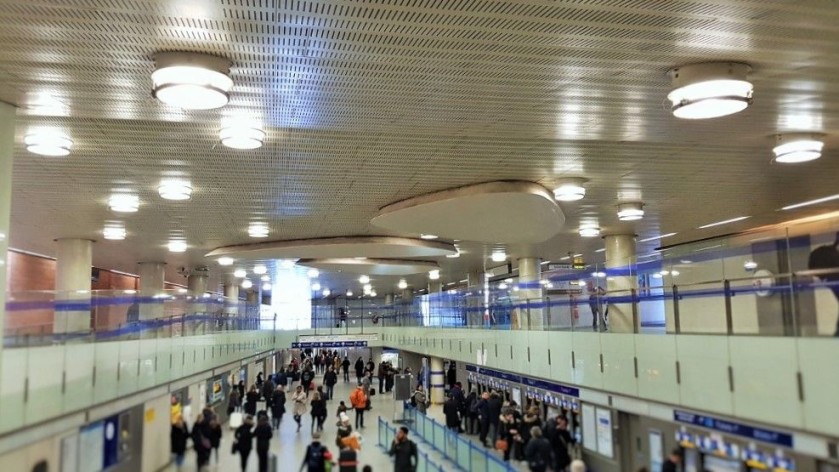
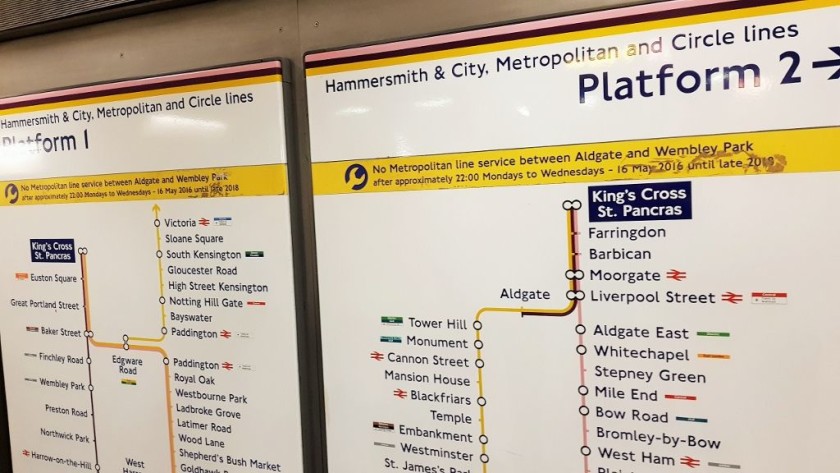
The Circle, Hammersmith & City and Metropolitan Lines all share a route in central London so they use the same platforms/tracks.
The first train to arrive can be a Circle Line train and the second to arrive can be a Hammersmith & City line train etc.
The trains will also look the same, so watch the departure indicators on the platforms carefully.
If you will be going to Paddington look for trains heading to Hammersmith.
Though if you want a step-free route to Paddington take a southbound Thameslink station on a one-stop-hop to Farringdon station, where an elevator transfer is available to the westbound Elizabeth Line trains; all of which will call at Paddington.
Any westbound train regardless of which line will call at Baker Street (for Madame Tussauds) and any eastbound train will be calling at Farringdon, Barbican or Liverpool Street.
For the Tower Of London take the Circle Line eastbound to Tower Hill.
by the Northern Line:
The Northern Line provides a link to the Financial District of London, take southbound trains to Moorgate or Bank
For Camden and its markets, take any northbound train to Camden Town.
Southbound Northern Line trains also provide an alternative link to the Thameslink trains for accessing the London Bridge area where Borough Market and The Shard are located.
If you are heading to the market the quickest option is to take the Northern Line to London Bridge and then use the Borough High St exit at the station
Onward connections by Thameslink trains:
The trains that are heading south from platform/track A in the ‘Thameslink’ station at St Pancras International give much better access to some parts of London than the Underground.
(1) For St Pauls take a train to City Thameslink and use the exit by the front of the trains at that station on to Ludgate Hill.
(2) For Tate Modern and The Globe Theatre take a train to Blackfriars and then at that station, use the South Bank exits which will be by the front of the train.
(3) For Westminster take any ‘Thameslink’ train south to Blackfriars and connect there for an westbound District or Circle line train; the interchange at Blackfriars will be towards the rear of the train.
This will be quicker than taking the Circle Line direct and less frantic than taking the Victoria Line and making the transfer at Victoria station.
(4) Thameslink trains also now provide a direct link to Greenwich from St Pancras International
Take trains heading to Rainham which typically depart every 30 minutes.
To the Elizabeth Line
The southbound Thameslink trains now also connect at Farringdon with the new Elizabeth Line.
Farringdon station is a 3 minute one station hop from St Pancras and elevators and escalators provide the connection to the Elizabeth Line.
So a combination of Thameslink and Elizabeth Line trains now provides the fastest connections when travelling between St Pancras International and both Canary Wharf and The Excel Exhibition Centre.
Getting to St Pancras:
St Pancras is located on the north-eastern edge of the central London area in a place where several major roads meet, so it's a constantly busy area, with the fact that Kings Cross station is just across the street, adding yet more people and traffic to the mix.
The fact that two of London's busiest stations share a location is why the Underground station which serves them has more lines than any other.
Though if you take the Northern, Piccadilly and Victoria Lines to Kings Cross-St Pancras, you need to walk through fairly lengthy subways in order to access the mainline trains which leave from St Pancras International.
For a stress-free onward departure allow at least five minutes to make the transfer when taking the Northern and Piccadilly lines; and up that to seven minutes when taking the Victoria line.
Taking the bus
If you can spare the time, taking a bus to St Pancras International can therefore make for an easier transfer to the trains, particularly if you take routes 46; 91; 214 and 390 on routes heading north away from central London.
These four routes all arrive at stops on the same block as St Pancras International, so you won't even have to cross the street in order to enter the station.
Routes 91 and 390 use a stop in front of the station, while routes 46 and 214 arrive at a particularly convenient location between the entrance to Eurostar check-in and the main entrance on Pancras Road
Please support ShowMeTheJourney
This second version of ShowMeTheJourney is exciting and new, so we are genuinely thrilled that you are here and reading this, but we also need your help.
We’re striving not to let anything get in the way of providing the most useful service possible, hence a facility has been set up with DonorBox which can be used to support the running costs and make improvements.
Instead of advertising or paywalls, your financial support will make a positive difference to delivering an enhanced service, as there’s a lot of ideas which we want to make happen.
So if you have found the info provided here to be useful, please go here to say thank you.
Journeys
# Jump to a directionJourneys from London St Pancras International
Jump to directionsLondon to Aachen by train
London to Aix - en - Provence by train
London to Amsterdam by train
London to Angers by train
London to Antibes by train
London to Antwerpen / Antwerp / Anvers by train
London to Avignon by train
London to Barcelona by train
London to Basel / Bâle by train
London to Berlin by train
London to Béziers / Beziers by train
London to Biarritz by train
London to Bordeaux by train
London to Brugge / Bruges by train
London to Bruxelles / Brussels by train
London to Cannes by train
London to Canterbury by train
London to Den Haag / The Hague by train
London to Frankfurt by train
London to Genève / Geneva by train
London to Gent / Ghent / Gand by train
London to Hamburg by train
London to Köln / Cologne / Koeln by train
London to Lausanne by train
London to Lille by train
London to Luxembourg by train
London to Lyon by train
London to Marseille by train
London to Milano / Milan / Mailand by train
London to Montpellier by train
London to München / Munich by train
London to Nice by train
London to Nîmes / Nimes by train
London to Paris by train
London to Rennes by train
London to Rotterdam by train
London to Strasbourg by train
London to Torino / Turin by train
London to Toulouse by train
London to Wien / Vienna by train
London to Zürich / Zurich by train
Journeys to London St Pancras International
Jump to directionsAmsterdam to London by train
Barcelona to London by train
Basel / Bâle to London by train
Berlin to London by train
Bruxelles / Brussels to London by train
Frankfurt to London by train
Genève / Geneva to London by train
Hamburg to London by train
Köln / Cologne / Koeln to London by train
Lille to London by train
Lyon to London by train
Marseille to London by train
Milano / Milan / Mailand to London by train
München / Munich to London by train
Paris to London by train
Torino / Turin to London by train
Wien / Vienna to London by train
Zürich / Zurich to London by train
This second version of ShowMeTheJourney is exciting and new, so we are genuinely thrilled that you are here and reading this, but we also need your help.
We’re striving not to let anything get in the way of providing the most useful service possible, hence a facility has been set up with DonorBox which can be used to support the running costs and make improvements.
Instead of advertising or paywalls, your financial support will make a positive difference to delivering an enhanced service, as there’s a lot of ideas which we want to make happen.
So if you have found the info provided here to be useful, please consider saying thank you.

This is one of more than 100 train travel guides available on ShowMeTheJourney, which will make it easier to take the train journeys you want or need to make. As always, all images were captured on trips taken by ShowMeTheJourney.









